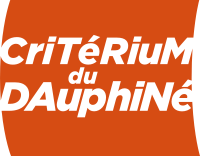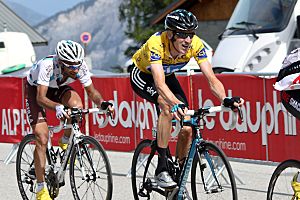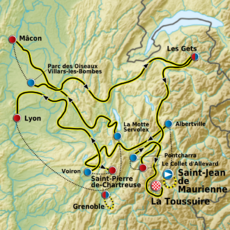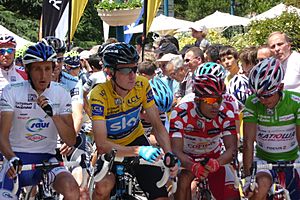Critérium du Dauphiné facts for kids
 |
|
| Race details | |
|---|---|
| Date | Early June |
| Region | Rhône-Alpes, France |
| Local name(s) | Critérium du Dauphiné |
| Nickname(s) | The Dauphiné |
| Discipline | Road |
| Competition | UCI World Tour |
| Type | Stage race |
| Organiser | Amaury Sport Organisation |
| Race director | Bernard Thévenet |
| History | |
| First edition | 1947 |
| Editions | 76 (as of 2024) |
| First winner | |
| Most wins | (3 wins each) |
| Most recent | |
The Critérium du Dauphiné, before 2010 known as the Critérium du Dauphiné Libéré, is an annual cycling road race in the Dauphiné region in the southeast of France. The race is run over eight days during the first half of June. It is part of the UCI World Tour calendar and counts as one of the foremost races in the lead-up to the Tour de France in July, along with the Tour de Suisse in the latter half of June.
The race was inaugurated in 1947 by a local newspaper, the Dauphiné Libéré, which served as the event's title sponsor until 2009. Since 2010 the race has been organized by ASO, which also organizes most other prominent French cycling races, notably the Tour de France, Paris–Nice and Paris–Roubaix.
As the Dauphiné is set in the Rhône-Alpes region, part of the French Alps, the race's protagonists are often climbing specialists. Many well-known climbs from the Tour de France – like the Mont Ventoux, the Col du Galibier or Col de la Chartreuse – are regularly addressed in the Dauphiné. Five riders, Nello Lauredi, Luis Ocaña, Charly Mottet, Bernard Hinault and Chris Froome, share the record of most wins, with three each.
Contents
History
Creation
The race was created in 1947 by newspaper Le Dauphiné libéré to promote its circulation. After World War II, as cycling recovered from a universal five- or six-year hiatus, the Grenoble-based newspaper decided to create and organize a cycling stage race covering the Dauphiné region. The race was named after the newspaper and set in June, prior to the Tour de France. Polish rider Edward Klabiński won the inaugural edition.
Because of its mountainous route and date on the calendar, the race served as preparation for the Tour de France by French cyclists. French cycling icons Jean Robic and Louison Bobet used the Dauphiné Libéré as the ultimate stage race in their build-up towards the Tour de France.
The event was discontinued for two years in 1967 and 1968. The current form of the Critérium du Dauphiné is the consequence of a merger with the Circuit des Six-Provinces-Dauphiné in 1969. For many years, the organization of the Dauphiné was shared between the newspaper publishers and ASO. In 2010, the newspaper ceded all organizational responsibility to ASO, and the race's name was abbreviated to Critérium du Dauphiné.
For many decades, the race has also served as a test for both bike manufacturers to test advanced equipment, and for TV broadcasters preparing the Tour de France, as TV coverage is difficult in the mountainous region.
World Tour Event

In the 1990s the race was categorized as a UCI 2.HC event, cycling's highest-rated stage races behind the Grand Tours. In 2005 it was included in the inaugural UCI Pro Tour and in 2011 in its successor, the UCI World Tour.
The Critérium du Dauphiné is the only race that was won by all the quintuple winners of the Tour de France, namely Jacques Anquetil, Eddy Merckx, Bernard Hinault and Miguel Induráin. Eleven racers have also won the race and the Tour de France in the same year: Louison Bobet in 1955; Anquetil in 1963; Merckx in 1971; Luis Ocaña in 1973; Bernard Thévenet in 1975; Hinault in 1979 and 1981; Induráin in 1995; Bradley Wiggins in 2012; Chris Froome in 2013, 2015, and 2016; Geraint Thomas in 2018 and Jonas Vingegaard in 2023. Lance Armstrong won the race in 2002 and 2003, but was retroactively stripped of his titles in 2013, in the wake of the protracted doping scandal.
Route
The Dauphiné is raced over 8 days in the Rhône-Alpes region in the southeast of France, traditionally covering portions of the French Alps. The race has often, but not always, started with an opening prologue on Sunday. The Monday and Tuesday stages are usually held in the lower hilly regions of Rhône-Alpes, before addressing the high mountains in the second half of the Dauphiné. Often there is one long individual or team time trial included.
Benefiting from its location and place on the calendar, race organizers often feature a mountain stage with a route that is nearly identical to what the Tour will trace one month later.
Grenoble, the capital of the Dauphiné region, has hosted the start or finish of a stage most often. Other cities regularly hosting a stage are Avignon, Saint-Étienne, Annecy, Chambéry, Gap, Lyon, Aix-les-Bains, Valence, Briançon and Vals-les-Bains.
Jerseys
The leader of the general classification wears a yellow jersey with a blue band, distinct from the other racers. In 1948, a mountains classification was added, which as of 2017 gives a polka-dot jersey to the leader. In 1955, a points classification was added, which gives a green jersey to the leader.
Winners
| Rider | Team | |||
|---|---|---|---|---|
| 1947 | Edward Klabiński | Mercier–Hutchinson | ||
| 1948 | Édouard Fachleitner | La Perle–Hutchinson | ||
| 1949 | Lucien Lazaridès | France Sport–Dunlop | ||
| 1950 | Nello Lauredi | Helyett–Hutchinson | ||
| 1951 | Nello Lauredi | Helyett–Hutchinson | ||
| 1952 | Jean Dotto | France Sport | ||
| 1953 | Lucien Teisseire | Terrot–Hutchinson | ||
| 1954 | Nello Lauredi | Terrot–Hutchinson | ||
| 1955 | Louison Bobet | Mercier–BP–Hutchinson | ||
| 1956 | Alex Close | Elvé–Peugeot | ||
| 1957 | Marcel Rohrbach | Peugeot–BP–Dunlop | ||
| 1958 | Louis Rostollan | Essor–Leroux | ||
| 1959 | Henry Anglade | Liberia–Hutchinson | ||
| 1960 | Jean Dotto | Liberia–Grammont | ||
| 1961 | Brian Robinson | Rapha–Gitane–Dunlop | ||
| 1962 | Raymond Mastrotto | Gitane–Leroux–Dunlop–R. Geminiani | ||
| 1963 | Jacques Anquetil | Saint-Raphaël–Gitane–R. Geminiani | ||
| 1964 | Valentín Uriona | Kas–Kaskol | ||
| 1965 | Jacques Anquetil | Ford France–Gitane | ||
| 1966 | Raymond Poulidor | Mercier–BP–Hutchinson | ||
| 1969 | Raymond Poulidor | Mercier–BP–Hutchinson | ||
| 1970 | Luis Ocaña | Bic | ||
| 1971 | Eddy Merckx | Molteni | ||
| 1972 | Luis Ocaña | Bic | ||
| 1973 | Luis Ocaña | Bic | ||
| 1974 | Alain Santy | Gan–Mercier–Hutchinson | ||
| 1975 | Bernard Thévenet | Peugeot–BP–Michelin | ||
| 1976 | Bernard Thévenet | Peugeot–Esso–Michelin | ||
| 1977 | Bernard Hinault | Gitane–Campagnolo | ||
| 1978 | Michel Pollentier | Old Lord's–Splendor–K.S.B. | ||
| 1979 | Bernard Hinault | Renault–Gitane | ||
| 1980 | Johan van der Velde | TI–Raleigh–Creda | ||
| 1981 | Bernard Hinault | Renault–Elf–Gitane | ||
| 1982 | Michel Laurent | Peugeot–Shell–Michelin | ||
| 1983 | Greg LeMond | Renault–Elf | ||
| 1984 | Martín Ramírez | Système U | ||
| 1985 | Phil Anderson | Panasonic–Raleigh | ||
| 1986 | Urs Zimmermann | Carrera Jeans–Vagabond | ||
| 1987 | Charly Mottet | Système U | ||
| 1988 | Luis Herrera | Café de Colombia | ||
| 1989 | Charly Mottet | RMO | ||
| 1990 | Robert Millar | Z–Tomasso | ||
| 1991 | Luis Herrera | Postobón–Manzana–Ryalcao | ||
| 1992 | Charly Mottet | RMO | ||
| 1993 | Laurent Dufaux | ONCE | ||
| 1994 | Laurent Dufaux | ONCE | ||
| 1995 | Miguel Induráin | Banesto | ||
| 1996 | Miguel Induráin | Banesto | ||
| 1997 | Udo Bölts | Team Telekom | ||
| 1998 | Armand de Las Cuevas | Banesto | ||
| 1999 | Alexander Vinokourov | Casino–Ag2r Prévoyance | ||
| 2000 | Tyler Hamilton | U.S. Postal Service | ||
| 2001 | Christophe Moreau | Festina | ||
| 2002 | Result void | |||
| 2003 | Result void | |||
| 2004 | Iban Mayo | Euskaltel–Euskadi | ||
| 2005 | Iñigo Landaluze | Euskaltel–Euskadi | ||
| 2006 | Result void | |||
| 2007 | Christophe Moreau | AG2R Prévoyance | ||
| 2008 | Alejandro Valverde | Caisse d'Epargne | ||
| 2009 | Alejandro Valverde | Caisse d'Epargne | ||
| 2010 | Janez Brajkovič | Team RadioShack | ||
| 2011 | Bradley Wiggins | Team Sky | ||
| 2012 | Bradley Wiggins | Team Sky | ||
| 2013 | Chris Froome | Team Sky | ||
| 2014 | Andrew Talansky | Garmin–Sharp | ||
| 2015 | Chris Froome | Team Sky | ||
| 2016 | Chris Froome | Team Sky | ||
| 2017 | Jakob Fuglsang | Astana | ||
| 2018 | Geraint Thomas | Team Sky | ||
| 2019 | Jakob Fuglsang | Astana | ||
| 2020 | Daniel Martínez | EF Pro Cycling | ||
| 2021 | Richie Porte | Ineos Grenadiers | ||
| 2022 | Primož Roglič | Team Jumbo–Visma | ||
| 2023 | Jonas Vingegaard | Team Jumbo–Visma | ||
| 2024 | Primož Roglič | Bora–Hansgrohe | ||
Multiple winners
Riders in italic are still active
| Wins | Rider | Editions |
|---|---|---|
|
|
1950, 1951, 1954 | |
| 1970, 1972, 1973 | ||
| 1977, 1979, 1981 | ||
| 1987, 1989, 1992 | ||
| 2013, 2015, 2016 | ||
|
|
1952 + 1960 | |
| 1963 + 1965 | ||
| 1966 + 1969 | ||
| 1975 + 1976 | ||
| 1988 + 1991 | ||
| 1993 + 1994 | ||
| 1995 + 1996 | ||
| 2002 + 2003 | ||
| 2001 + 2007 | ||
| 2008 + 2009 | ||
| 2011 + 2012 | ||
| 2017 + 2019 | ||
| 2022 + 2024 |
Wins per country
There have been 76 editions since 1947. Three editions (2002, 2003 and 2006) have been stripped of their initial winners Lance Armstrong and Levi Leipheimer. Organizer ASO intends to keep these results voided.
| Wins | Country |
|---|---|
|
|
|
|
|
|
|
|
|
|
|
|
|
|
|
|
|
|
|
|
See also
 In Spanish: Critérium del Dauphiné para niños
In Spanish: Critérium del Dauphiné para niños



